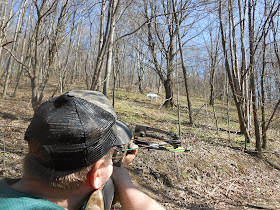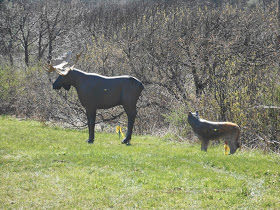 By Bob Frye
By Bob Frye
This time they mean to do something about it.
It has been 15 years since the cost of Pennsylvania hunting and trapping licenses increased, from $12 to $19. On and off for the last 10 of those years, Game Commission officials have talked about the need to bump up costs a bit.
The commission can't set its own license fees, though. Only state lawmakers have that authority.
And they've been unwilling to act. The commission is going to press the issue — in a cooperative way — this summer, however.
The plan is for the agency to determine internally among staff and board members, how much money it needs to sustain itself over the next 15 years, executive director Matt Hough said. It will take that information to key members of the state House of Representatives and Senate and to sportsmen and other conservation partners for support, he added.
The hope is license fees can be increased in time for the 2016-17 license year, he said.
Hough first outlined that timeline this past week in giving his annual report to the House game and fisheries committee. He was asked for specifics.
“How much of an increase are you thinking you might need? And how long do you expect that to last,” asked the committee's chairman, Republican Keith Gillespie of York County.
“We really don't have a specific proposal yet,” Hough said. “But the idea is to be able to say, ‘We need X number of dollars. We don't care how we get there, but this is what we need.' ”
He said possible, as an example, that the commission might ask for the cost of a general hunting license to go from its current $19 to $29 for five years, then to $39 for five years after that.
Whether the commission might also ask for the prices of special licenses — like those for archery and bear hunting — to go up is undecided, he said.
Right now, according to information provided by commission press secretary Travis Lau, hunting in Pennsylvania is a bargain.
A Pennsylvania resident who wants the right to hunt an antlered deer, spring and fall turkeys, pheasants and other small game, and waterfowl — excluding the cost of a federal duck stamp — needs spend $24 on licenses, he said.
By comparison, a license conveying those same privileges would cost a hunter $32 in New York, $34 in Maryland and West Virginia, $56 in Virginia, $73 in Michigan, $106 in Ohio, $116 in Wisconsin and $122 in New Jersey, according to Lau's figures.
Hough suggested lawmakers could ease the burden on sportsmen, though.
Many other states provide their wildlife agencies with general tax revenues to help offset their expenses, he said. That doesn't happen in Pennsylvania.
The commission gets about 37 percent of its revenue from license sales, according to commission figures. That's the biggest contributor to its budget.
The commission wants to retain that, Hough said. The “North American Model” of wildlife management calls for hunters and trappers to foot most of the bill for wildlife conservation, and that's been so successful the commission wants to keep that as the basis of its operations, Hough said.
But getting some general fund money — a portion of any severance tax adopted on Marcellus shale gas extraction, a piece of the sales tax collected on hunting and shooting equipment, or something else — is critical and will only be more so in the future, he said.
“As our base — the number of hunters and trappers — declines, that just means each individual left has to pay more and more, and I'm not sure how much longer they can do that,” Hough said.
The consequences of not finding more money for the agency will be real, he warned.
In 2005, for example, the commission had 100 vacancies on its staff — many of them food and cover corps workers tasked with creating wildlife habitat on state game lands — that it could not afford to fill. Infrastructure needs went unaddressed, too.
“We had maintenance people driving trucks, state vehicles, that couldn't leave the state game lands because they wouldn't pass inspection,” Hough said.
The commission was able to address those problems using money generated from Marcellus shale leases, he said. But that has largely run its course, he said.
If new money isn't found, there will be cutbacks of all sorts, he said.
“Habitat work on game lands will go undone, research on species will not be completed, pheasant stockings will decrease, and violations of the law will go undetected,” Hough said. “This is the stark financial reality that we face.”
Ideally, the commission, sportsmen and lawmakers can come up with a plan for staving all that off, he said.
“I think if we do it the right way, we can make this happen,” Hough said.
Bob Frye is a staff writer for Trib Total Media. Reach him at bfrye@tribweb.com or via Twitter @bobfryeoutdoors.





















